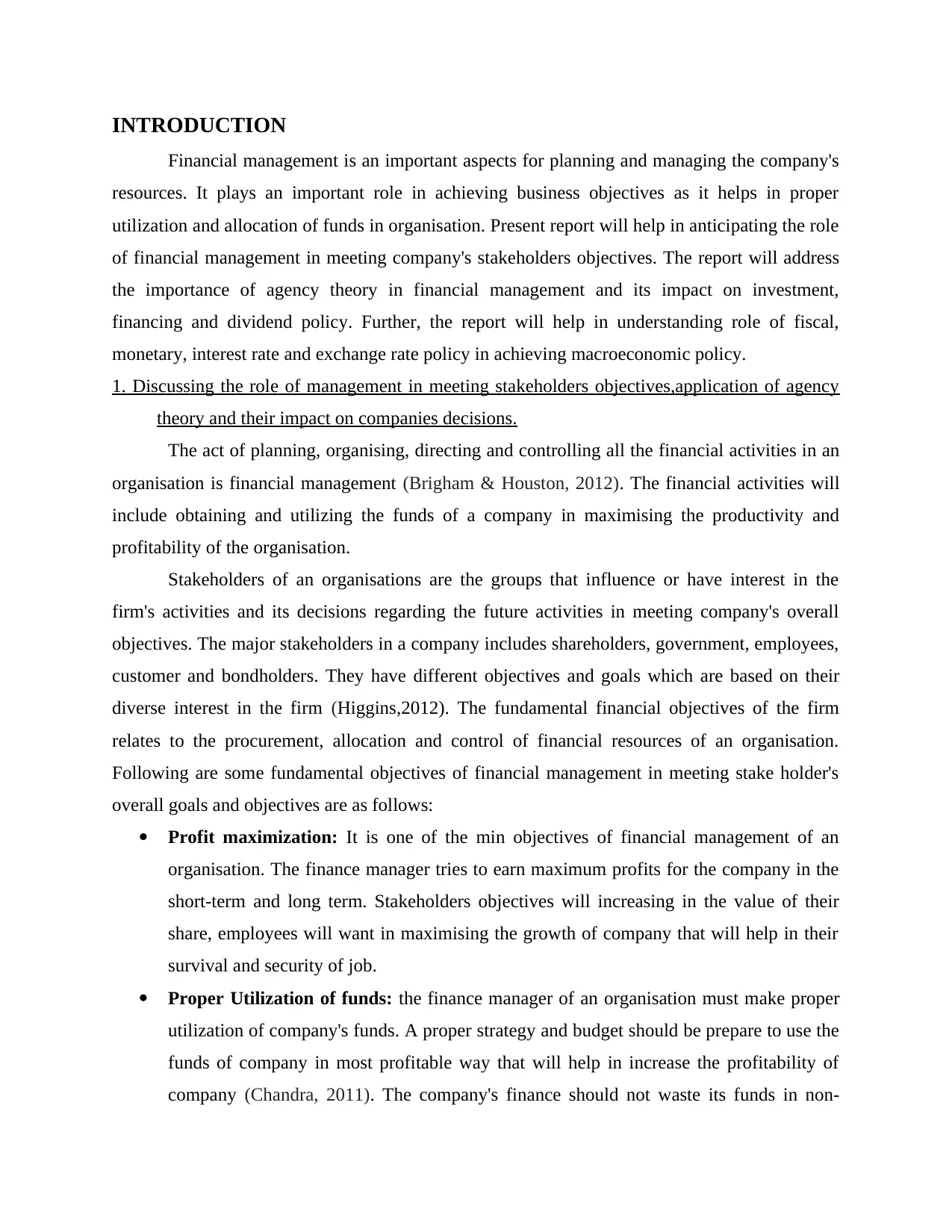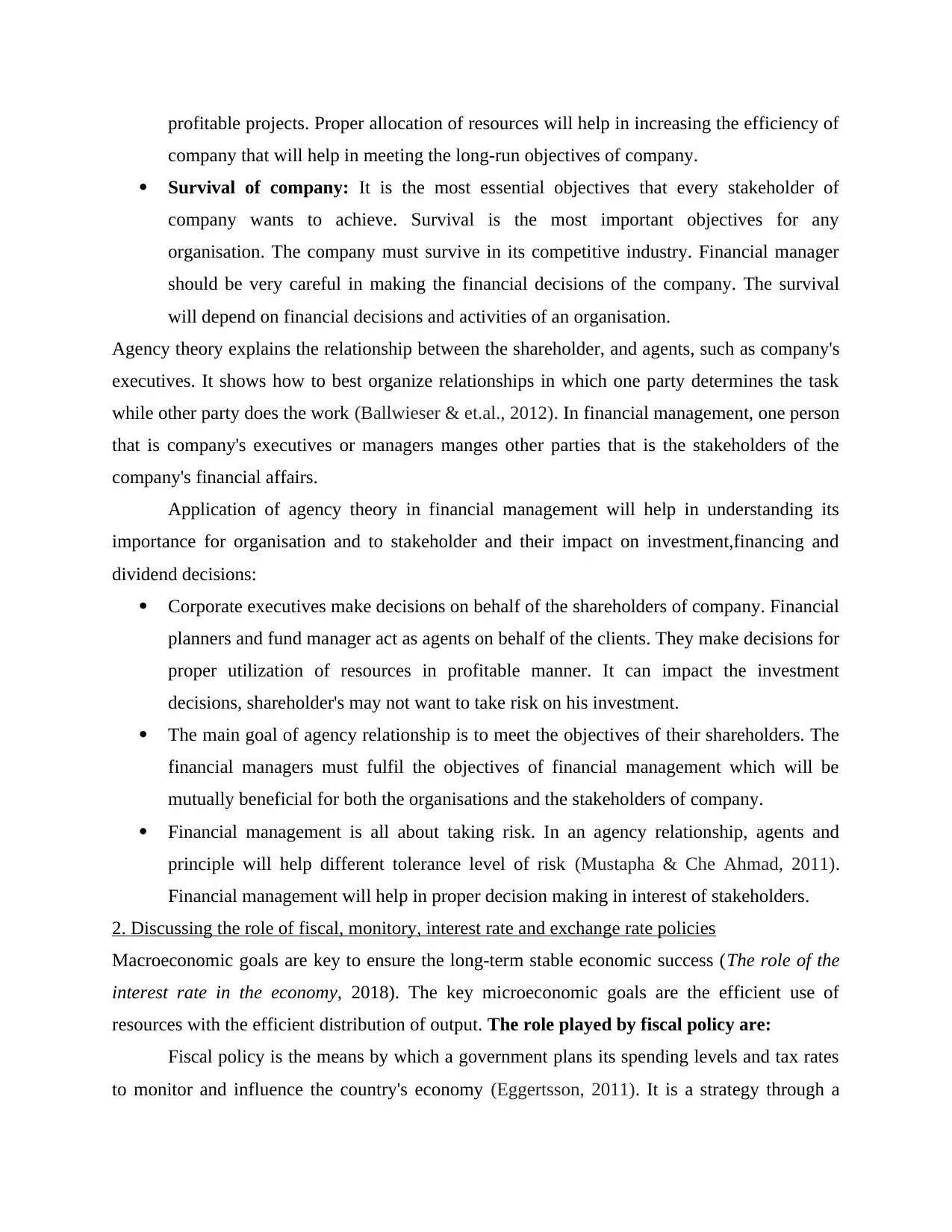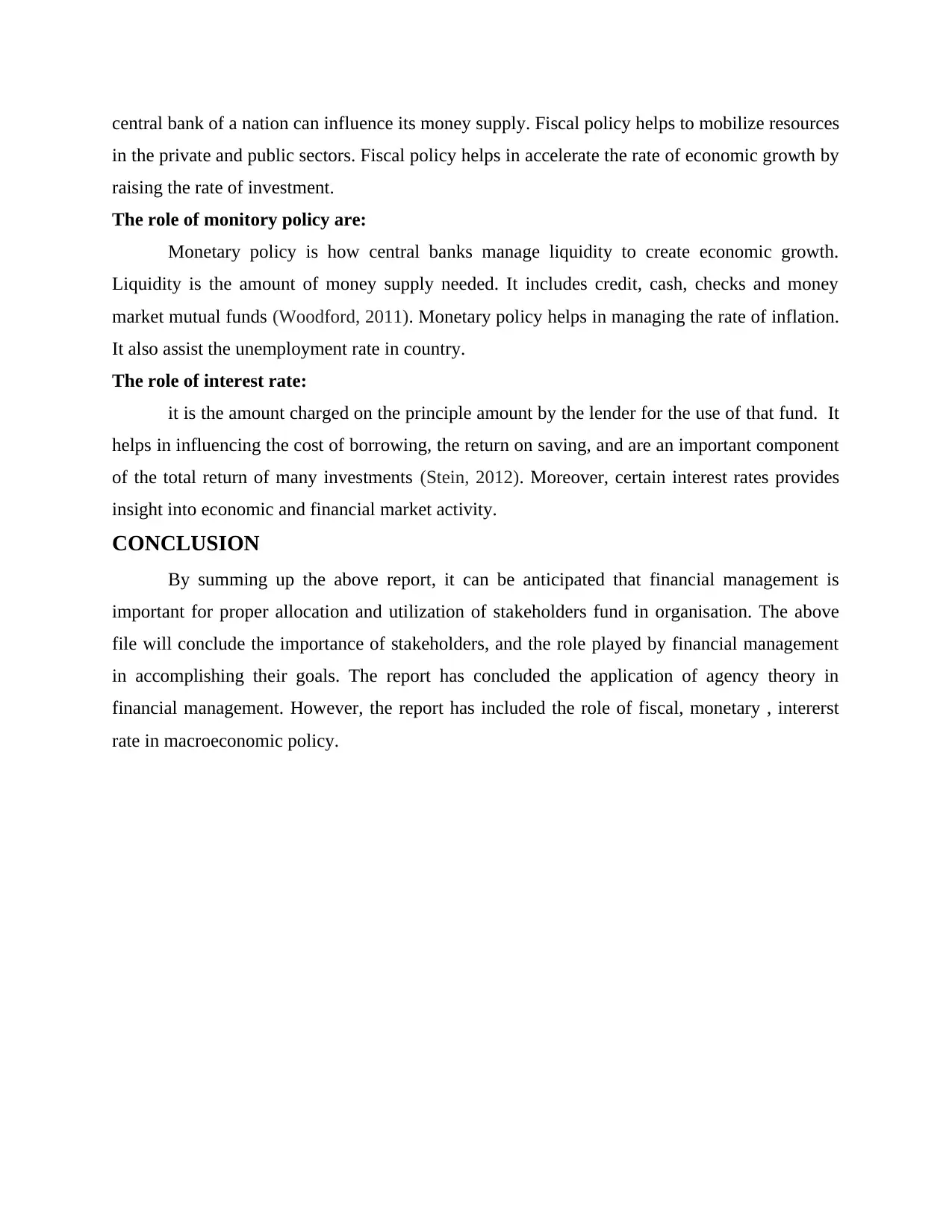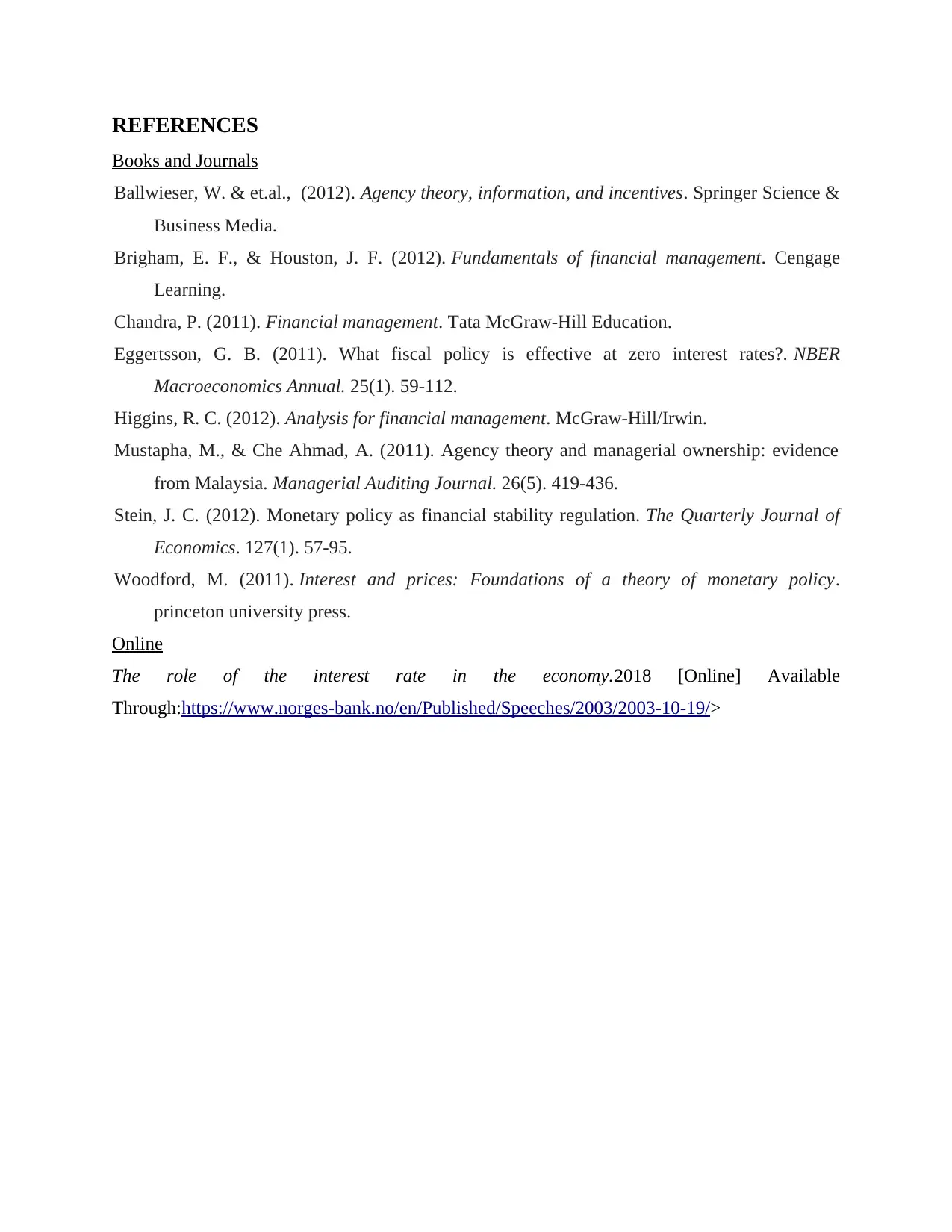Financial Management Report: Stakeholders, Agency Theory, and Policies
VerifiedAdded on 2020/10/23
|6
|1387
|198
Report
AI Summary
This report delves into the core aspects of financial management, emphasizing its pivotal role in aligning with stakeholder objectives. It explores the significance of agency theory in financial decision-making, including its impact on investment, financing, and dividend policies. Furthermore, the report examines the influence of fiscal, monetary, interest rate, and exchange rate policies on macroeconomic stability. The analysis underscores the importance of strategic financial planning and resource allocation to achieve organizational goals and ensure long-term sustainability. The report also provides an overview of how different stakeholders' objectives are met through financial management practices. The report provides a comprehensive analysis of the role of financial management in achieving organizational objectives and meeting stakeholder expectations.

FINANCIAL MANAGEMENT
Paraphrase This Document
Need a fresh take? Get an instant paraphrase of this document with our AI Paraphraser

Table of Contents
INTRODUCTION ..........................................................................................................................3
1. Discussing the role of management in meeting stakeholders objectives,application of
agency theory and their impact on companies decisions............................................................3
2. Discussing the role of fiscal, monitory, interest rate and exchange rate policies...................4
CONCLUSION................................................................................................................................5
REFERENCES................................................................................................................................6
INTRODUCTION ..........................................................................................................................3
1. Discussing the role of management in meeting stakeholders objectives,application of
agency theory and their impact on companies decisions............................................................3
2. Discussing the role of fiscal, monitory, interest rate and exchange rate policies...................4
CONCLUSION................................................................................................................................5
REFERENCES................................................................................................................................6

INTRODUCTION
Financial management is an important aspects for planning and managing the company's
resources. It plays an important role in achieving business objectives as it helps in proper
utilization and allocation of funds in organisation. Present report will help in anticipating the role
of financial management in meeting company's stakeholders objectives. The report will address
the importance of agency theory in financial management and its impact on investment,
financing and dividend policy. Further, the report will help in understanding role of fiscal,
monetary, interest rate and exchange rate policy in achieving macroeconomic policy.
1. Discussing the role of management in meeting stakeholders objectives,application of agency
theory and their impact on companies decisions.
The act of planning, organising, directing and controlling all the financial activities in an
organisation is financial management (Brigham & Houston, 2012). The financial activities will
include obtaining and utilizing the funds of a company in maximising the productivity and
profitability of the organisation.
Stakeholders of an organisations are the groups that influence or have interest in the
firm's activities and its decisions regarding the future activities in meeting company's overall
objectives. The major stakeholders in a company includes shareholders, government, employees,
customer and bondholders. They have different objectives and goals which are based on their
diverse interest in the firm (Higgins,2012). The fundamental financial objectives of the firm
relates to the procurement, allocation and control of financial resources of an organisation.
Following are some fundamental objectives of financial management in meeting stake holder's
overall goals and objectives are as follows:
Profit maximization: It is one of the min objectives of financial management of an
organisation. The finance manager tries to earn maximum profits for the company in the
short-term and long term. Stakeholders objectives will increasing in the value of their
share, employees will want in maximising the growth of company that will help in their
survival and security of job.
Proper Utilization of funds: the finance manager of an organisation must make proper
utilization of company's funds. A proper strategy and budget should be prepare to use the
funds of company in most profitable way that will help in increase the profitability of
company (Chandra, 2011). The company's finance should not waste its funds in non-
Financial management is an important aspects for planning and managing the company's
resources. It plays an important role in achieving business objectives as it helps in proper
utilization and allocation of funds in organisation. Present report will help in anticipating the role
of financial management in meeting company's stakeholders objectives. The report will address
the importance of agency theory in financial management and its impact on investment,
financing and dividend policy. Further, the report will help in understanding role of fiscal,
monetary, interest rate and exchange rate policy in achieving macroeconomic policy.
1. Discussing the role of management in meeting stakeholders objectives,application of agency
theory and their impact on companies decisions.
The act of planning, organising, directing and controlling all the financial activities in an
organisation is financial management (Brigham & Houston, 2012). The financial activities will
include obtaining and utilizing the funds of a company in maximising the productivity and
profitability of the organisation.
Stakeholders of an organisations are the groups that influence or have interest in the
firm's activities and its decisions regarding the future activities in meeting company's overall
objectives. The major stakeholders in a company includes shareholders, government, employees,
customer and bondholders. They have different objectives and goals which are based on their
diverse interest in the firm (Higgins,2012). The fundamental financial objectives of the firm
relates to the procurement, allocation and control of financial resources of an organisation.
Following are some fundamental objectives of financial management in meeting stake holder's
overall goals and objectives are as follows:
Profit maximization: It is one of the min objectives of financial management of an
organisation. The finance manager tries to earn maximum profits for the company in the
short-term and long term. Stakeholders objectives will increasing in the value of their
share, employees will want in maximising the growth of company that will help in their
survival and security of job.
Proper Utilization of funds: the finance manager of an organisation must make proper
utilization of company's funds. A proper strategy and budget should be prepare to use the
funds of company in most profitable way that will help in increase the profitability of
company (Chandra, 2011). The company's finance should not waste its funds in non-
⊘ This is a preview!⊘
Do you want full access?
Subscribe today to unlock all pages.

Trusted by 1+ million students worldwide

profitable projects. Proper allocation of resources will help in increasing the efficiency of
company that will help in meeting the long-run objectives of company.
Survival of company: It is the most essential objectives that every stakeholder of
company wants to achieve. Survival is the most important objectives for any
organisation. The company must survive in its competitive industry. Financial manager
should be very careful in making the financial decisions of the company. The survival
will depend on financial decisions and activities of an organisation.
Agency theory explains the relationship between the shareholder, and agents, such as company's
executives. It shows how to best organize relationships in which one party determines the task
while other party does the work (Ballwieser & et.al., 2012). In financial management, one person
that is company's executives or managers manges other parties that is the stakeholders of the
company's financial affairs.
Application of agency theory in financial management will help in understanding its
importance for organisation and to stakeholder and their impact on investment,financing and
dividend decisions:
Corporate executives make decisions on behalf of the shareholders of company. Financial
planners and fund manager act as agents on behalf of the clients. They make decisions for
proper utilization of resources in profitable manner. It can impact the investment
decisions, shareholder's may not want to take risk on his investment.
The main goal of agency relationship is to meet the objectives of their shareholders. The
financial managers must fulfil the objectives of financial management which will be
mutually beneficial for both the organisations and the stakeholders of company.
Financial management is all about taking risk. In an agency relationship, agents and
principle will help different tolerance level of risk (Mustapha & Che Ahmad, 2011).
Financial management will help in proper decision making in interest of stakeholders.
2. Discussing the role of fiscal, monitory, interest rate and exchange rate policies
Macroeconomic goals are key to ensure the long-term stable economic success (The role of the
interest rate in the economy, 2018). The key microeconomic goals are the efficient use of
resources with the efficient distribution of output. The role played by fiscal policy are:
Fiscal policy is the means by which a government plans its spending levels and tax rates
to monitor and influence the country's economy (Eggertsson, 2011). It is a strategy through a
company that will help in meeting the long-run objectives of company.
Survival of company: It is the most essential objectives that every stakeholder of
company wants to achieve. Survival is the most important objectives for any
organisation. The company must survive in its competitive industry. Financial manager
should be very careful in making the financial decisions of the company. The survival
will depend on financial decisions and activities of an organisation.
Agency theory explains the relationship between the shareholder, and agents, such as company's
executives. It shows how to best organize relationships in which one party determines the task
while other party does the work (Ballwieser & et.al., 2012). In financial management, one person
that is company's executives or managers manges other parties that is the stakeholders of the
company's financial affairs.
Application of agency theory in financial management will help in understanding its
importance for organisation and to stakeholder and their impact on investment,financing and
dividend decisions:
Corporate executives make decisions on behalf of the shareholders of company. Financial
planners and fund manager act as agents on behalf of the clients. They make decisions for
proper utilization of resources in profitable manner. It can impact the investment
decisions, shareholder's may not want to take risk on his investment.
The main goal of agency relationship is to meet the objectives of their shareholders. The
financial managers must fulfil the objectives of financial management which will be
mutually beneficial for both the organisations and the stakeholders of company.
Financial management is all about taking risk. In an agency relationship, agents and
principle will help different tolerance level of risk (Mustapha & Che Ahmad, 2011).
Financial management will help in proper decision making in interest of stakeholders.
2. Discussing the role of fiscal, monitory, interest rate and exchange rate policies
Macroeconomic goals are key to ensure the long-term stable economic success (The role of the
interest rate in the economy, 2018). The key microeconomic goals are the efficient use of
resources with the efficient distribution of output. The role played by fiscal policy are:
Fiscal policy is the means by which a government plans its spending levels and tax rates
to monitor and influence the country's economy (Eggertsson, 2011). It is a strategy through a
Paraphrase This Document
Need a fresh take? Get an instant paraphrase of this document with our AI Paraphraser

central bank of a nation can influence its money supply. Fiscal policy helps to mobilize resources
in the private and public sectors. Fiscal policy helps in accelerate the rate of economic growth by
raising the rate of investment.
The role of monitory policy are:
Monetary policy is how central banks manage liquidity to create economic growth.
Liquidity is the amount of money supply needed. It includes credit, cash, checks and money
market mutual funds (Woodford, 2011). Monetary policy helps in managing the rate of inflation.
It also assist the unemployment rate in country.
The role of interest rate:
it is the amount charged on the principle amount by the lender for the use of that fund. It
helps in influencing the cost of borrowing, the return on saving, and are an important component
of the total return of many investments (Stein, 2012). Moreover, certain interest rates provides
insight into economic and financial market activity.
CONCLUSION
By summing up the above report, it can be anticipated that financial management is
important for proper allocation and utilization of stakeholders fund in organisation. The above
file will conclude the importance of stakeholders, and the role played by financial management
in accomplishing their goals. The report has concluded the application of agency theory in
financial management. However, the report has included the role of fiscal, monetary , intererst
rate in macroeconomic policy.
in the private and public sectors. Fiscal policy helps in accelerate the rate of economic growth by
raising the rate of investment.
The role of monitory policy are:
Monetary policy is how central banks manage liquidity to create economic growth.
Liquidity is the amount of money supply needed. It includes credit, cash, checks and money
market mutual funds (Woodford, 2011). Monetary policy helps in managing the rate of inflation.
It also assist the unemployment rate in country.
The role of interest rate:
it is the amount charged on the principle amount by the lender for the use of that fund. It
helps in influencing the cost of borrowing, the return on saving, and are an important component
of the total return of many investments (Stein, 2012). Moreover, certain interest rates provides
insight into economic and financial market activity.
CONCLUSION
By summing up the above report, it can be anticipated that financial management is
important for proper allocation and utilization of stakeholders fund in organisation. The above
file will conclude the importance of stakeholders, and the role played by financial management
in accomplishing their goals. The report has concluded the application of agency theory in
financial management. However, the report has included the role of fiscal, monetary , intererst
rate in macroeconomic policy.

REFERENCES
Books and Journals
Ballwieser, W. & et.al., (2012). Agency theory, information, and incentives. Springer Science &
Business Media.
Brigham, E. F., & Houston, J. F. (2012). Fundamentals of financial management. Cengage
Learning.
Chandra, P. (2011). Financial management. Tata McGraw-Hill Education.
Eggertsson, G. B. (2011). What fiscal policy is effective at zero interest rates?. NBER
Macroeconomics Annual. 25(1). 59-112.
Higgins, R. C. (2012). Analysis for financial management. McGraw-Hill/Irwin.
Mustapha, M., & Che Ahmad, A. (2011). Agency theory and managerial ownership: evidence
from Malaysia. Managerial Auditing Journal. 26(5). 419-436.
Stein, J. C. (2012). Monetary policy as financial stability regulation. The Quarterly Journal of
Economics. 127(1). 57-95.
Woodford, M. (2011). Interest and prices: Foundations of a theory of monetary policy.
princeton university press.
Online
The role of the interest rate in the economy.2018 [Online] Available
Through:https://www.norges-bank.no/en/Published/Speeches/2003/2003-10-19/>
Books and Journals
Ballwieser, W. & et.al., (2012). Agency theory, information, and incentives. Springer Science &
Business Media.
Brigham, E. F., & Houston, J. F. (2012). Fundamentals of financial management. Cengage
Learning.
Chandra, P. (2011). Financial management. Tata McGraw-Hill Education.
Eggertsson, G. B. (2011). What fiscal policy is effective at zero interest rates?. NBER
Macroeconomics Annual. 25(1). 59-112.
Higgins, R. C. (2012). Analysis for financial management. McGraw-Hill/Irwin.
Mustapha, M., & Che Ahmad, A. (2011). Agency theory and managerial ownership: evidence
from Malaysia. Managerial Auditing Journal. 26(5). 419-436.
Stein, J. C. (2012). Monetary policy as financial stability regulation. The Quarterly Journal of
Economics. 127(1). 57-95.
Woodford, M. (2011). Interest and prices: Foundations of a theory of monetary policy.
princeton university press.
Online
The role of the interest rate in the economy.2018 [Online] Available
Through:https://www.norges-bank.no/en/Published/Speeches/2003/2003-10-19/>
⊘ This is a preview!⊘
Do you want full access?
Subscribe today to unlock all pages.

Trusted by 1+ million students worldwide
1 out of 6
Related Documents
Your All-in-One AI-Powered Toolkit for Academic Success.
+13062052269
info@desklib.com
Available 24*7 on WhatsApp / Email
![[object Object]](/_next/static/media/star-bottom.7253800d.svg)
Unlock your academic potential
Copyright © 2020–2026 A2Z Services. All Rights Reserved. Developed and managed by ZUCOL.





